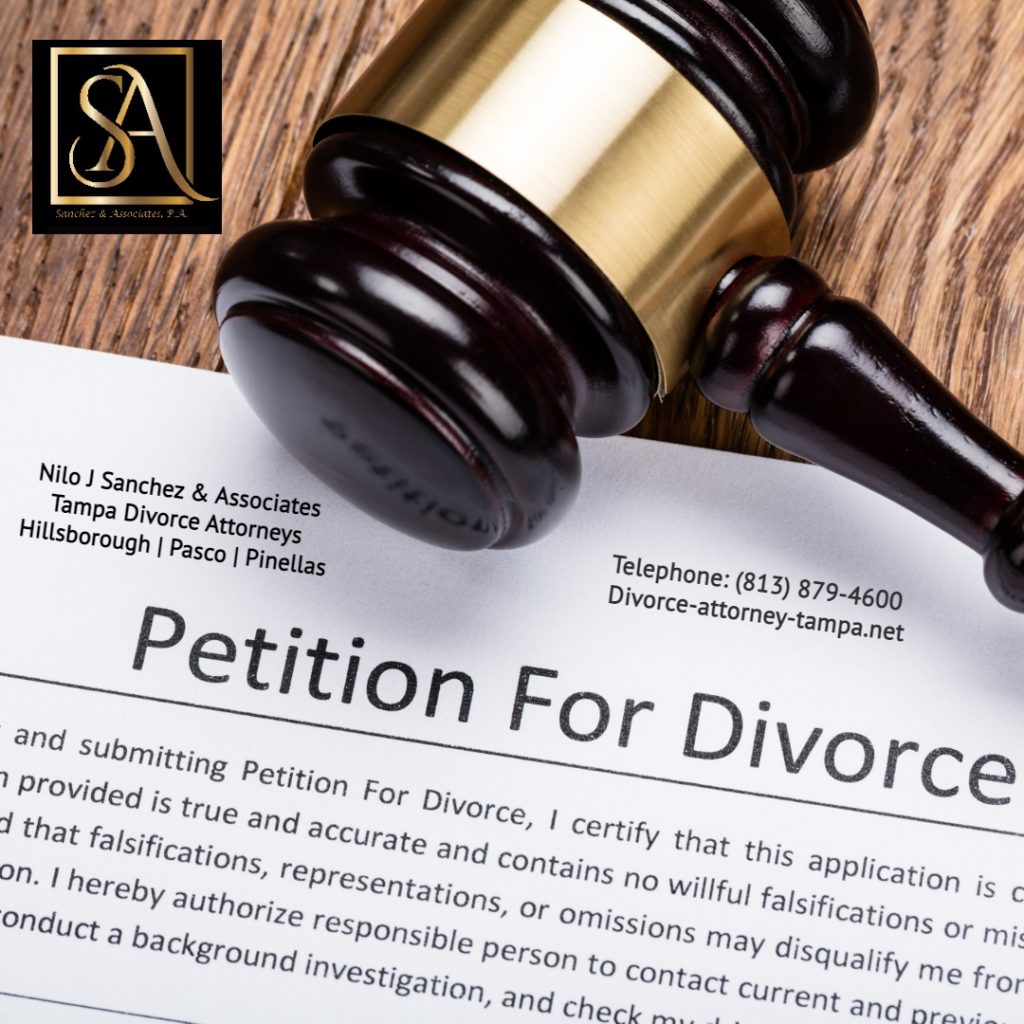Dissolution of Marriage in Tampa Bay, Florida

When couples are divorcing, matters that must be resolved in a dissolution of marriage in Florida include;.
- Division of assets & liabilities (Equitable Distribution)
- Alimony
- Child support
- Child custody/Timesharing
There may be additional issues that will be included and settled in your divorce, such as if you and your spouse have high assets or if you and/or your spouse are business owners.
[ct_spacer height=”5″]
Read: How Matters Are Settled in a Contested Divorce in Tampa Bay (PEACE Process)
Petition for Dissolution of Marriage in Tampa Bay
Attorney Sanchez & Associates realize that not all divorce cases are alike and require individualized attention to achieve the very best results. If you have been served with a petition for dissolution of marriage in a contested divorce time is of the essence to respond to the lawsuit.
Please call 813-879-4600 or send us a message below to inquire about scheduling a consultation as soon as possible.
Caring, Result Oriented Tampa Bay Divorce Attorneys
If you need to consult with a Tampa divorce attorney about filing for a divorce in Hillsborough County, FL or surrounding jurisdictions in Tampa Bay, please reach out to us. Nilo J Sanchez & Associates offers caring, result oriented counsel that will help ease you into the next chapter of your life. Finding the best Tampa Divorce and Family Law Attorney for you begins with sitting down and discussing the unique aspects of your case. Rest assured, our family lawyers will not rush you through a consultation, but rather will take the time that you need and deserve, so you can gain confidence in the choice you are making.
Watch: Contested Divorce Process with Attorney Nilo J Sanchez
Learn more:
Contested divorces in Tampa Bay, Florida
Hiring a Tampa High Asset Divorce Attorney
Marital Settlement Agreements vs. Litigation
Collaborative Divorce Process
Florida Statutes, Dissolution of Marriage
(1) No judgment of dissolution of marriage shall be granted unless one of the following facts appears.
(a) The marriage is irretrievably broken.
(b) Mental incapacity of one of the parties. However, no dissolution shall be allowed unless the party alleged to be incapacitated shall have adjudged incapacitated according to the provisions of s. 744.331 for a preceding period of at least 3 years. Notice of the proceeding for dissolution shall be served upon one of the nearest blood relatives or guardian of the incapacitated person, and the relative or guardian shall be entitled to appear and to be heard upon the issues. If the incapacitated party has a general guardian other than the party bringing the proceeding, the petition and summons shall be served upon the incapacitated party and the guardian; and the guardian shall defend and protect the interests of the incapacitated party. If the incapacitated party has no guardian other than the party bringing the proceeding, the court shall appoint a guardian ad litem to defend and protect the interests of the incapacitated party. However, in all dissolutions of marriage granted on the basis of incapacity, the court may require the petitioner to pay alimony pursuant to the provisions of s. 61.08.
(2) Based on the evidence at the hearing, which evidence need not be corroborated except to establish that the residence requirements of s. 61.021 are met which may be corroborated by a valid Florida Driver’s license, a Florida voter’s registration card, a valid Florida identification card issued under s. 322.051, or the testimony or affidavit of a third party, the court shall dispose of the petition for dissolution of marriage when the petition is based on the allegation that the marriage is irretrievably broken as follows:
(a) If there is no minor child of the marriage and if the responding party does not, by answer to the petition for dissolution, deny that the marriage is irretrievably broken, the court shall enter a judgment of dissolution of marriage if the court finds that the marriage is irretrievably broken.
(b) When there is a minor child of the marriage, or when the responding party denies by answer to the petition for dissolution that the marriage is irretrievably broken, the court may:
1. Order either or both parties to consult with a marriage counselor, psychologist, psychiatrist, minister, priest, rabbi, or any other person deemed qualified by the court and acceptable to the party or parties ordered to seek consultation; or
2. Continue the proceedings for a reasonable length of time not to exceed 3 months, to enable the parties themselves to effect a reconciliation; or
3. Take such other action as may be in the best interest of the parties and the minor child of the marriage.
If, at any time, the court finds the marriage is irretrievably broken, the court shall enter a judgment of dissolution of the marriage. If the court finds that the marriage is not irretrievably broken, it shall deny the petition for dissolution of marriage.
(3) during any period of continuance, the court may make appropriate orders for the support and alimony of the parties; the parenting plan, support, maintenance, and education of the minor child of the marriage, attorney’s fees; and the preservation of the property of the parties.
(4) A judgment of dissolution of marriage shall result in each spouse having the status of being single and unmarried. No judgment of dissolution of marriage renders the child of the marriage a child born out of wedlock.
(5) The court may enforce an antenuptial agreement to arbitrate a dispute in accordance with the law and tradition chosen by the parties.
(6) Any injunction for protection against domestic violence arising out of the dissolution of marriage proceeding shall be issued as a separate order in compliance with chapter 7.41 and shall not be included in the judgment of dissolution of marriage.
(7) In the initial pleading for a dissolution of marriage as a separate attachment to the pleading, each party is required to provide his or her social security number and the full names and social security numbers of each of the minor children of the marriage.
(8) Pursuant to the federal Personal Responsibility and Work Opportunity Reconciliation Act of 1996, each party is required to provide his or her social security number in accordance with this section. Each party is also required to provide the full name, date of birth, and social security number for each minor child of the marriage. Disclosure of social security numbers obtained through this requirement shall be limited to the purpose of administration of the Title IV-D program for child support enforcement.
Read:
- Hiring the Best Brandon Florida Divorce Attorneys for You
- Hiring a Divorce Lawyer in Tampa Bay
- Dissolution of Marriage
- MSA’s (Marital Settlement Agreements_ vs. Litigation
